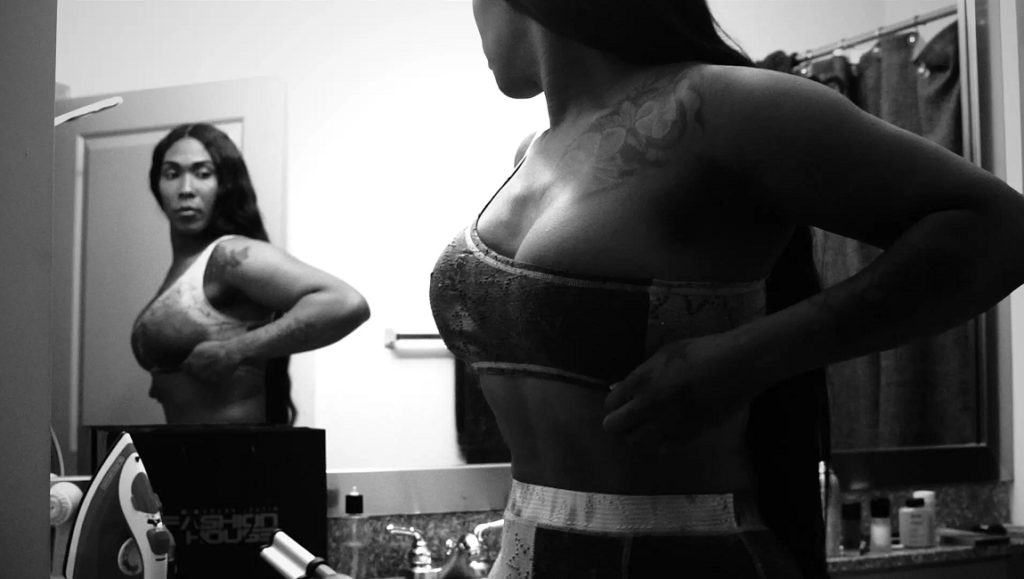Clocking in at a breezy 73 minutes, Kokomo City — which bagged audience awards at both the Sundance and Berlin film festivals — proves a deceptively slight affair. Its documentarian sensibilities are frequently challenged by gently jarring musicality; its frames glow and blink under woozy, saturated monochrome. The atonal and sexy aesthetic it wears, however, stands sharply against its brusque subject matter and, in a way, accords the latter a reverence seldom seen even in contemporary political discourse. Kokomo City, naturally, examines that great intersectionality of marginalization bedeviled by conservatives and pitied by liberals: Black, trans, woman, sex worker.
Director D. Smith brings a semblance of levity to her portrait of queerness and socio-economic disenfranchisement; with as much visual anarchy as is respectably permitted within her talking-heads setup, she documents — but seldom profiles — her four main subjects in confrontation with the camera. Koko Da Doll and Liyah Mitchell, hailing from Atlanta, appear before its gaze just as resident New Yorkers Daniella Carter and Dominique Silver do. The film begins with a creative re-enactment of a violent encounter between Liyah and one of her clients (more muscular than her and armed with a Glock), which Smith conducts via snappy montages and a flippant segue to a Shutterstock gun. But just as quickly as its hedonic trappings come, they make way for a looming realization that the threat these women face is acute, daily, and real.
Kokomo City doesn’t need to profile them, in fact; much of their lives on the streets has already been conditioned by thorough profiling. Koko intimates that sex, for her, has been divested of all personal meaning, having been taught by circumstance to view it in exclusively monetary terms: “If you don’t have anything for me, I don’t wanna deal with you.” At the heart of her claims, as with the rest, lies an ethos of pure survival. The sheer agglomeration of marginalized identities has not only intensified society’s general disdain for them, but also incurred the wrath of their ostensible allies. Men seek to dominate their bodies; women see them as competitors; Black women, homewreckers; and, for anybody else who doesn’t subsist on the cruel economy of sex work, pariahs unworthy of equal recognition. “Violence doesn’t happen before the orgasm — it happens after,” Dominique states, referring to the countless men for whom sexual release alone cannot satisfy their masculinity. The trick that trans sex workers turn, then, is twofold: first the sex, and then the second humiliation and denial of erstwhile manhood.
There’s a powerful undercurrent of resilience captured in Smith’s enmeshing of jazz photography and cinéma vérité, which problematizes the logic of what Michael Sicinski terms “respectability politics.” Within this oft-neoliberal conception, subjects are distanced, glossed over, made-over, and even sidelined when their personal narratives don’t gel with the ideological tune expected of them. Kokomo City avoids this for the most part by embracing the margins both in form and in substance. The Black trans women sex workers we see are neither homogeneous nor unchanging; their lives and relationships are as tenuous and paradoxical (perhaps more so) as our own. Daniella describes the hurt she feels she caused her mother upon coming out as trans, contending that the security Black women place on having male children is there to compensate for their absent spouses, and that she has once more robbed her mother of it.
Reminiscent of Jennie Livingston’s 1990 cornerstone, Paris Is Burning, but also close to its NYC-bound contemporary The Stroll (directed by Zackary Drucker and Kristen Lovell), Kokomo City takes its title from Kokomo Arnold, the famed Blues musician and crooner of “Sissy Man Blues,” which appears on the soundtrack. Though on occasion sparse with commentary on its supporting characters — predominantly the men who are trans-attracted and openly so — Kokomo City proffers a bold and necessary glimpse of some of the individuals we give short shrift to, knowingly or otherwise. The murder of Koko, barely three months after its premiere, only bolsters the need for recognition the film valiantly, if incompletely, satisfies. Ending on a defiant note, Smith moves from portraiture to raw physicality, training her camera on her subject’s nude body, tits and cock and all. It’s a body that, come whatever may, will likely be here to stay.
DIRECTOR: D. Smith; CAST: —; DISTRIBUTOR: Magnolia Pictures; IN THEATERS: July 28; RUNTIME: 1 hr. 3 min.


Comments are closed.